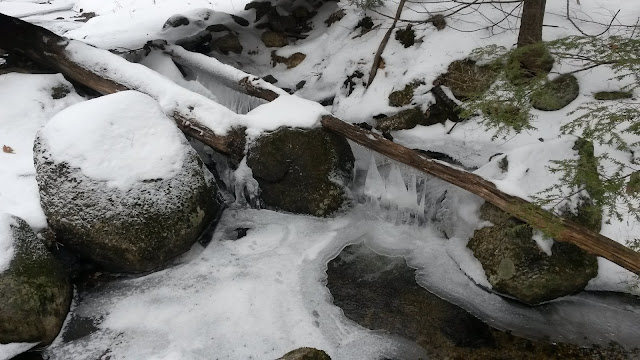As the water flowed into the lake it raised the level and pushed the ice up, cracking the ice a few feet out from the shore because the ice at the edge of the lake is firmly attached to the shoreline.
 |
| A rising lake level pushed up the ice |
So we had more good skating on the lake before the next weather event.
 |
| Smooth skating, but still sticking to the coves |
The next weather event: a quick snow storm. And as usually happens after a winter storm in New England, it was followed by a torrent of cold air from the northwest; this particular blast sent us winds as high as 40 miles per hour. It was wild on the lake, looking rather like the arctic, and the wind over the smooth ice blew the lake clear again in many places (click below for video).
The rain had also raised the streams which froze over quickly as the mercury dropped, but when the water drained off into the lake, their ice-crust fell back into the streams, showing just how quickly small streams can rise and fall.
 |
| Streams rose quickly with frozen ground rejecting the rain, and then receded just as fast |
Rushing brooks and cold temperatures always conspire to make glistening winter sights.
 |
| Splashing and freezing water forms crystal stalactites |
Arriving with the snow were goldfinches, even more than the last storm - at one point I counted 28. They filled up the feeder slots, some aggressively guarding their post, others patiently waiting their turn on the taxi way.
On the blustery day they were often blown off course on their approach and had to circle around to attempt a second landing.
 |
| Blown off course by the Polar Express |
 |
| "Goldfinch 2 - You're off the glidepath - circle around and try again" |
The birds aren't quite as adept at eating as they are at flying - or maybe they are. All the seeds they drop on the ground are perhaps intentional, as they dig through the seed looking for the choicest morsel in the feeder. The nuthatches are the most notorious at this, but the squirrels appreciate it. After the storm I counted six red squirrels on the ground at one time.
Rain, snow, cold, warm, wind, clouds, sun - just another wondrous winter-week in New Hampshire's Lakes Region.










No comments:
Post a Comment